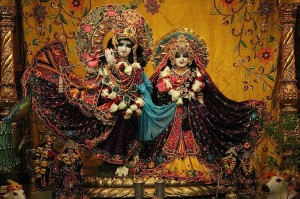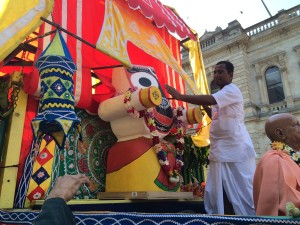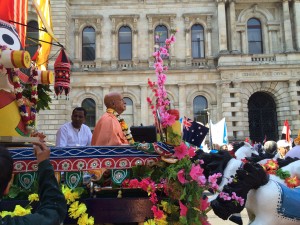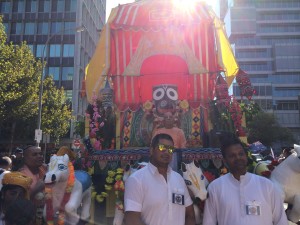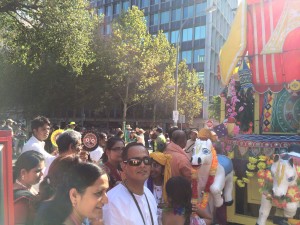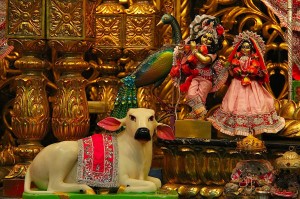2014 01 26 Sunday Feast Eagerness to Hear Chant and Serve Radhanath Swami ISKCON Chowpatty
2014 01 26 Sunday Feast Eagerness to Hear Chant and Serve Radhanath Swami ISKCON Chowpatty
Is this all by random chance??
→ Servant of the Servant
Hare Krishna
CHOICE
→ Gita Coaching
We Should Not Do Anything Artificial
→ Japa Group

"Should we think of Krsna’s forms and pastimes while chanting japa? We should not do anything artificial. As Prabhupada has said, the chanting is not an artificial imposition on the mind. Prabhupada has recommended that if we just hear the chanting then the time will come when simultaneously we will think of the form of Krsna. To concentrate on the sound may seem routine. Of course, that is only our neophyte stage."
From Japa Reform Notebook
by Satsvarupa dasa Goswami
He Was a Great Saintly Person
→ travelingmonk.com
New Vrindaban Daily darsan @ February 8, 2014.
→ New Vrindaban Brijabasi Spirit
Vrndavana is wonderful. The two sweet fair and dark splendors named Radha and Krsna are wonderful. Pure love for Their lotus feet is wonderful. He who has faith in Them and rises to the spiritual world is wonderful. The rare soul who understands these truths is wonderful.
[Source : Nectarean Glories of Sri Vrindavana-dhama by Srila Prabodhananda Sarasvati Thakura, 1-57 Translation.]
Offering potato chips!?
→ KKSBlog
(Kadamba Kanana Swami, 16 December 2013, Sandton, South Africa, Srimad Bhagavatam 1.17.38)
Krsna is like the sun, maya is like darkness; wherever there is Krsna, maya’s influence cannot be there. So in this way, we don’t have to fear. We don’t have to think, “How will I conquer? How will I ever conquer this illusory energy? I feel weak”. Then it means that we should engage in more hearing and chanting, have more devotee association and take only Krsna-prasadam. No potato chips, nothing – just Krsna-prasadam.
You may say, “I offer my potato chips!”
 Alright, but actually, they’ve already been offered to the factory workers. Actually to tell you the truth, if you’re cooking for Krsna and someone walks into the kitchen and just puts his hand straight into the pot and starts eating from it, will you still offer it to Krsna?
Alright, but actually, they’ve already been offered to the factory workers. Actually to tell you the truth, if you’re cooking for Krsna and someone walks into the kitchen and just puts his hand straight into the pot and starts eating from it, will you still offer it to Krsna?
Well, there was a devotee, near Ermelo (in South Africa) who had a big chips factory and one time, they wanted me to go there to bless the factory. You know, “Swamiji, please come and bless our factory?”
So, I went and blessed the factory and checked it out and I saw trucks of potatoes coming in and then being washed and chopped up by machines, and then the slices are dried and they go on the conveyor belt, and then there is a dip and they go through the hot oil and they come out brown and crispy. Then on the other side, as they come out, there is some machine that blows on hot spices onto the chips which stick on. The chips are still hot and spicy and there are the workers, “Chomp! Chomp! Chomp!” Eating the chips! I saw (laughing). I was like, okay… so much for the chips, you know! But if we take shelter, we take shelter of Krsna-prasadam, then everything is there. There is no doubt of that…
Appearance of Varaha Avatara (Boar Incarnation)
→ The Toronto Hare Krishna Temple!
11 Feb 2014 – Varaha Dvadasi
→ ISKCON Desire Tree
Huge vaishnava wedding reception ceremony in Iskcon Tirupati (Album 235 photos)
→ Dandavats.com
 The wedding of Sriman Revati Raman Prabhu, ISKCON Tirupati temple president's younger daughter, Kumari soon to be Sowbhagyavati Krishnacharanpriya to Sriman Chiranjivi Praneet. -- Read more ›
The wedding of Sriman Revati Raman Prabhu, ISKCON Tirupati temple president's younger daughter, Kumari soon to be Sowbhagyavati Krishnacharanpriya to Sriman Chiranjivi Praneet. -- Read more › Study Bhagavad-Gita and get certified towards Bhakti Sastri Degree
→ ISKCON BRAMPTON
Bhagavad Gita is also known as Gitopanishad. It is the essence of Vedic knowledge and one of the most important Upanishads in Vedic literature. Bhagavad Gita was spoken by Lord Krishna himself to Arjuna on the battlefield of Kurukshetra. This 700-verse scripture, teaches one how to practice Bhakti Yoga.
Every activity of the human being is to be considered a failure unless he inquires about the nature of the Absolute. Therefore those who begin to question:
*why they are suffering? or
*where they came from? and
*where they shall go after death?
are proper students for understanding Bhagavad-Gita.
Join Bhagavad Gita Course with His Grace Vaisnava Dasa, starting this Saturday[8th feb,2014] morning from 9.00AM-12.00PM
You'll get certified from Bhaktivedanta College at the completion of this course towards Bhakti Sastri Degree.
Regarding Course Registration Fees please contact:
Vaisnava Dasa Prabhu at your first preference, personally or via email[vaishnavadas@icloud.com]
Good morning Sri Vrindavan! (Album 160 photos)
→ Dandavats.com
 On this earth, the place known as Vrndavan in the district of Mathura, ninety miles southeast of Delhi, is a replica of that supreme Goloka Vrndavana in the spiritual sky. In all of India, that eighty-four-square-mile tract of land is considered to be the most sacred place of pilgrimage because Krishna sported in it, and many devotees still linger there in ecstasy in search of Krishna and His childhood associates. -- Read more ›
On this earth, the place known as Vrndavan in the district of Mathura, ninety miles southeast of Delhi, is a replica of that supreme Goloka Vrndavana in the spiritual sky. In all of India, that eighty-four-square-mile tract of land is considered to be the most sacred place of pilgrimage because Krishna sported in it, and many devotees still linger there in ecstasy in search of Krishna and His childhood associates. -- Read more › February 8th, 2014 – Darshan
→ Mayapur.com
The post February 8th, 2014 – Darshan appeared first on Mayapur.com.
The basis of all asramas and of the entire varnasrama institution is a stable, responsible grhasta asrama (Part 2)
→ SivaramaSwami.com
Он был великий святой
→ Traveling Monk
Глава 1
Сурат, Индия
В декабре 1970-го Шрила Прабхупада провел с двадцатью пятью своими западными учениками четырнадцать дней в Сурате (Индия). Пятью годами ранее по указанию своего духовного учителя Шрилы Бхактисиддханты Сарасвати он уехал на запад, чтобы распространять сознание Кришны. ИСККОН ко времени его возвращения был совсем еще молодым движением, но у Прабхупады было сильное желание проповедовать в Индии.
Индия в 70-е была страной, духовная культура которой быстро приходила в упадок. Под руководством своих политических лидеров страна шла путем капитализма, проложенным западными державами. Джавахарлал Неру, первый Премьер-министр Индии, однажды сказал: «Мы добились политической свободы, но наша революция не завершена. Она продолжается, поскольку одна только политическая свобода с экономическим прогрессом, но без гарантии права на жизнь в поиске счастья – никогда не удовлетворит людей».
Шрила Прабхупада хотел напомнить индийцам, что истинная слава их страны – в ее духовной культуре, которая одна могла бы дать непреходящее счастье и удовлетворение, которого все мы жаждем. «Шримад-Бхагаватам» ясно утверждает:
са ваи пумсам паро дхармо
йато бхактир адхокшадже
ахаитуки апратихата
йайатма супрасидати
«Высшим занятием [дхармой] для всех людей является такое занятие,
с помощью которого они могут прийти к любовному преданному служению
трансцендентному Господу. Чтобы полностью удовлетворить душу,
такое преданное служение должно быть бескорыстным и непрерывным».
[ШБ 1.2.6]
Подход Шрилы Прабхупады к разрешению индийской духовной дилеммы был очень интересным: он вернулся с западными учениками, чтобы показать своим согражданам, насколько культура Вед способна пленить воображение всего мира. Он с гордостью называл своих западных учеников «танцующими белыми слонами». Белого слона почитают в Индии как символ монархии.
Но Шрила Прабхупада и его ученики не ожидали, что жители Сурата устроят им такой прием. Известно, что гуджаратцы – преданные Кришны, но то вдохновение, с которым они принимали Прабхупаду, было беспрецедентным. Все учреждения города закрылись, толпы народа во главе с мэром приветствовали преданных на железнодорожной станции, тысячи людей приходили на лекции и киртаны, которые Шрила Прабхупада проводил во время визита, и сотни следовали за преданными на ежедневных харинамах. Во время тех знаменитых киртанов владельцы магазинов давали преданным свои товары, продукты, люди надевали на них гирлянды, умащали лбы сандаловой пастой и осыпали их цветочными лепестками.
На восьмой день пребывания в Сурате Шрила Прабхупада остановился с учениками в доме м-ра Багубхай Джаривалы, богатого и благочестивого бизнесмена. Каждое утро Шрила Прабхупада выходил на утреннюю прогулку по окрестностям, а потом проводил лекцию на втором этаже дома м-ра Джаривалы. На них часто бывали и соседи.
Спустя сорок четыре года после визита Шрилы Прабхупады я оказался в Сурате с сорока преданными нашего семинедельного фестивального тура по главным городам Гуджарата. Я расспросил местных преданных о здешних играх Шрилы Прабхупады и, к своему удивлению, узнал, что первая наша программа будет в том самом зале, в котором проводил программу он. Вечером тысячи людей пришли на наше четырехчасовое представление, на котором были классический индийский танец, спектакль, боевые искусства, кукольный театр и большой киртан. Я давал лекцию по Бхагавад-гите с того самого места, с которого говорил Шрила Прабхупада и явственно ощущал, что он присутствует и уполномочивает меня.
На следующий день местные преданные предложили нашей группе посетить дом м-ра Джаривала. Оказалось, что это небольшое трехэтажное здание; окна и двери были закрыты и наглухо заколочены. Стоя перед фасадом, я наблюдал, как с соседних домов собирается много людей, удивленных таким количеством иностранцев в их районе.
Я попытался представить Шрилу Прабхупаду в этом забаррикадированном месте.
– Как думаешь, позволят они нам войти внутрь? – спросил я преданного, приведшего нас сюда.
– Вряд ли, – сказал он. – М-р Джаривала оставил этот мир много лет тому назад. Внук его продал здание кому-то, местные говорят, что наркоторговцу, который всю свою контрабанду и хранит в этом доме. Вон в какую крепость его превратил.
– Все-таки, надо попытаться, – сказал я.
Вперед вышел кто-то из соседей:
– Проблема в том, что нового владельца никто никогда не видел. Живет он вроде бы через несколько улиц, только вот никто не рискнет к нему пойти.
– Я пойду, – сказал долговязый парень-подросток, – не верю я этим сплетням.
– Мы были бы очень благодарны, – ответил я, – у наших преданных появился бы шанс повидать, где в те времена останавливался наш духовный учитель.
Соседи все подходили, и все больше народу включалось в разговор.
– Я видел вашего гуру, – сказал один мужчина, – мне было семь лет, когда он приехал и остановился по соседству. Я видел, как он выходил по утрам на прогулку с учениками. Вся местная детвора увязывалась за ним, и он всегда говорил о Кришне. Он производил на нас неизгладимое впечатление! Мы ждали, пока он не вернется и не поднимется на балкон. Он часто нам махал, и мы думали: вот это нам повезло. Мы прекрасно понимали, что он был великий святой.
– Возвратившись в дом, он давал лекцию по «Шримад-Бхагаватам», – сказал другой мужчина. Я помню, с какой легкостью он цитировал множество стихов из Писаний. Я тогда был совсем ребенком, но не пропустил ни одной лекции.
– Каждый день после лекции он на час посылал своих учеников петь харинам по окрестностям, – произнес старик. – Это уж мы все любили: за ними шла огромная толпа. Мне тогда было двадцать. Как-то я подошел к нему и спросил, откуда он столько знает о Кришне. Он улыбнулся и дал мне копию Бхагавад-гиты. Он даже подписал ее, она до сих пор у меня – и я каждый день ее читаю.
– А мои родители готовили фрукты и сладости ему и ученикам, – сказала женщина. – Помню, что вечером они раскладывали все на серебряные подносы и относили их Свамиджи. Помню, мама ежедневно начищала эти серебряные подносы, приговаривая: «Для гуру все должно быть безукоризненно».
– До его приезда никто не знал про движение сознания Кришны, – сказала другая женщина. – Мы были просто потрясены, когда он вдруг появился со своими белыми учениками. Они были очень серьезны в преданном служении. Даже кое-то из наших, видя насколько они искренни, тоже стал серьезнее относиться к своей преданности Кришне. И вот смотрите, сколько лет прошло – а народ в округе все вспоминает его визит.
– Мне родители тоже рассказывали о его приезде, но сам я никогда его не видел, – сказал еще один мужчина. – А вы его ученик?
– Ну да, – ответил я.
Люди переглянулись под впечатлением.
– Вам очень повезло, – сказал кто-то.
– О да, – отозвался я, пытаясь справиться с волной переполнявших меня эмоций.
– А петь вы будете, как пели тогда ваши друзья? – спросил кто-то из детей. – Было бы здорово!
– Да, петь будем, – отвечал я, – но также я очень надеюсь, что получится войти в здание…
Не успел я договорить, как заметил, что люди отчего-то забеспокоились. Толпа расступилась, и ко мне подошел высокий человек, по всей видимости, владелец здания. Одет он был как настоящий джентльмен и, на мой взгляд, совершенно не походил на наркодилера. Краем глаза я успел заметить, что некоторые дети побежали к своим домам и закрыли за собой двери.
– Я так понимаю, вы хотите зайти в мой дом, – пробасил мужчина, и непонятно было, вызывающе он говорит или просто спрашивает.
– Сэр, мой духовный учитель Шрила А.Ч.Бхактиведанта Свами Прабхупада останавливался в вашем доме со своими учениками, когда приехал в Сурат сорок четыре года тому назад. Мы были бы вам очень обязаны, если бы можно было посмотреть на комнаты, в которых он останавливался.
Он расплылся в широкой улыбке. Все опасения мои улетучились.
– Добро пожаловать в мой дом, – сказал он. – Это честь для меня. Я слышал о вашем духовном учителе. Он был великий святой. А большие грешники нуждаются в милости святых.
Он подмигнул толпе, явно зная о слухах, которые ходят о нем.
– Следуйте за мной, – сказал он и, переведя нас через улицу, открыл несколько висячих замков и пригласил войти. – Я покажу вам, где он читал лекции.
Мы прошли через несколько рядов огромных мешков, открытых и набитых текстилем. На втором этаже он провел нас в просторную пустую комнату.
– Вот здесь проходили лекции. Он садился у этой стены, вот здесь, на большую подушку, а ученики и народ с округи рассаживались по комнате.
Он отвел нас в другую комнату.
– Здесь была его спальня, – он показал в угол комнаты. – Вот здесь стояла его кровать.
– А вы многое знаете о его приезде, сэр, – сказал я.
– Его хорошо знают в этом районе, – отвечал он.
– Можем мы провести киртан в память о нашем учителе? – спросил я.
– Да, конечно, – ответил он. – Пойте сколько хотите.
Закрыв глаза, я запел пранама-мантру Шриле Прабхупаде. А когда открыл, то увидел, какие глубокие духовные эмоции отражаются на лицах подпевающих преданных. Я запел Харе Кришна, и преданные, воздев руки, стали покачиваться вправо-влево. Домовладелец тоже поднял руки, и запел, и начал с нами танцевать. Соседи, глядя на него, вовсю улыбались.
«Похоже, сплетням конец», – думал я, посмеиваясь про себя. Я завершил киртан молитвами премадхвани, и соседи вместе с хозяином дома присоединились к преданным, когда те склонили головы к полу.
«А всего час назад были совершенно незнакомы, – подумал я. – Шрила Прабхупада, сила Ваша продолжает очищать этот мир». И сказал вслух:
– Теперь нам надо, следуя по стопам нашего духовного учителя, вынести воспевание на улицы.
Мы благодарили владельца здания, и он, вешая большой висячий замок обратно на входную дверь, улыбался нам в ответ.
– В любое время можете возвращаться, – сказал он.
– Мы вернемся, – ответил я. – Ваш дом – святое место.
Пока мы собирали инструменты для харинамы, один из бывших на киртане соседей подошел ко мне.
– Хотел бы обратить ваше внимание, что теперь в этом районе живет много семей мусульман, – сказал он. – Фактически, большинство торговцев на рынке через улицу – мусульмане. У Гуджарата своя история напряженности между мусульманами и хинду.
Я решил разведать обстановку до начала харинамы. Прошел 30 метров до угла улицы и внимательно осмотрел большой уличный базар: сотни людей торговали за прилавками, казалось, бесконечным разнообразием фруктов, овощей, одежды и разной утвари. Какой-то высокий бородач-мусульманин посреди этой толпы перехватил мой взгляд и уже не переставая смотрел на меня. Вокруг него было десять-пятнадцать мужчин, выглядевших так же как он.
– Ждите здесь, – сказал я преданным и, прихватив с собой пару наших ребят, пересек улицу и подошел к мусульманину.
– Ас-саламу алейкум, – сказал я, протягивая мужчине руку.
– Ва-алейкум ас-салям*, – отозвался он. Взял мою руку и, пожимая ее, расплылся в улыбке.
– Мы преданные Господа Кришны из западных стран, – сказал я. – Приехали прославить нашего духовного учителя, который много лет тому назад останавливался в одном доме здесь через улицу.
– Долг духовного практика – прославлять того, кто указывает путь к Аллаху, – сказал мужчина. – Как вы прославляете своего учителя, так и мы прославляем Мохаммеда. Мир ему и благословение.
Он был так дружелюбен и открыт, что я решил сделать следующий шаг.
– Мы хотели бы прославить Бога на этом рынке воспеванием Его имен. Хотели бы узнать, не будет ли у вас или еще у кого-нибудь возражений?
На лицах некоторых мужчин промелькнуло недоброе выражение. Некоторые стали перешептываться. Однако, высокий мужчина, явно самый у них уважаемый, покачал головой.
– Никто не будет возражать. Аллах Акбар – Бог велик. Можете петь Его имена на этом рынке.
Некоторые мужчины смотрели на него удивленно, а он продолжал:
– В нашем районе между мусульманами и хинду различий нет. Но на всякий случай отправлю с вами сопровождение, двоих моих братьев. Если вдруг какие проблемы от мусульман на рынке будут, они позаботятся об этом. Он сделал жест двоим, чтобы те вышли вперед.
– Это Абдул Кави и Ахмед. Ахмед – чемпион Гуджарата по карате.
Я пожал руки обоим.
– Джентльмены, – сказал я. – Пойдемте.
Пока преданные на базаре пели и танцевали в экстазе, я думал о том, как Шрила Прабхупада посылал своих учеников воспевать на эту же самую улицу столько лет тому назад. Многие торговцы фруктами предлагали нам бананы, яблоки, виноград. Люди улыбались и махали, когда мы проходили мимо них, а когда мы останавливались, они выходили с нами потанцевать. Но также я видел, что Абдул Кави и Ахмед обменялись парой сильных слов с группой молодых мусульманских парней. Когда Ахмед заметил мой взгляд, он улыбнулся и махнул, будто говоря: «Все под контролем».
Собралась большая толпа, и я видел, что и хинду, и мусульмане, и фарси, – все улыбаются. Мы пели и танцевали несколько часов, а потом вернулись к своим автобусам, ехать обратно в храм.
– Почему бы еще не попеть? – спросил меня один преданный.
– Больше не можем, – ответил я. – Абдул Кави и Ахмед ушли на работу.
Преданный посмотрел на меня непонимающе:
– Кто?
– Потом объясню, – улыбнулся я. – К тому же, всем вам надо отдохнуть перед вечерним фестивалем.
***********************
«Победа! Победа! Победа! Что за чудо я вижу: все несчастья джив порушены,
никто не идет в ад, у Ямараджа больше нет работы, и влияние Кали-юги ушло в небытие.
Все оттого, что всюду в мире все больше и больше преданных Господа Вишну,
танцуя и играя на музыкальных инструментах, воспевают Его имена».
[Дивйа-прабандха, Тируваймоли 5.2.1 Наммальвара, одного из двенадцати великих
Вайшнавских святых Южной Индии. Он явился в 3102 г. до н.э. ]
Фотоальбом на FB: https://www.facebook.com/indradyumna/media_set?set=a.10201416530798169.1073742144.1321748113&type=1
_________________
* Мир вам! – И вам мир! (прим. перев.)
Vasnta Panchami – A Yellow day..
→ Mayapur.com
Click here to view Vasanta Panchami Darshan Celebrated on the onset of spring, Vasanta Pancami marks the beginning of new life with yellow mustard flowers starting to bloom, and nature displaying her majestic beauty. Thus the colour of the festival is yellow. The Deities in the temples, especially in Vrindavana wear yellow, or yellow-green on […]
The post Vasnta Panchami – A Yellow day.. appeared first on Mayapur.com.
Prabhupada Letters :: Anthology 2014-02-08 11:24:00 →
Prabhupada Letters :: 1969
Prabhupada Letters :: Anthology 2014-02-08 11:21:00 →
Prabhupada Letters :: 1970
Prabhupada Letters :: Anthology 2014-02-08 11:06:00 →
Prabhupada Letters :: 1970
Prabhupada Letters :: Anthology 2014-02-08 11:05:00 →
Prabhupada Letters :: 1970
Prabhupada Letters :: Anthology 2014-02-08 11:01:00 →
Prabhupada Letters :: 1972
Prabhupada Letters :: Anthology 2014-02-08 11:00:00 →
Prabhupada Letters :: 1974
Prabhupada Letters :: Anthology 2014-02-08 10:46:00 →
Prabhupada Letters :: 1974
Prabhupada Letters :: Anthology 2014-02-08 10:40:00 →
Prabhupada Letters :: 1974
Beyond any dream
→ KKSBlog
(Kadamba Kanana Swami, 2010, South Africa, Lecture)

This is the world where the dream is bigger than reality but in the spiritual world, the reality is way beyond the dream. The chanting of the maha mantra is coming directly from the spiritual world and if we place the holy name in the center of our life then everything will happen…
The name of Krsna is Krsna and when we chant his name, the sound vibration enters our ears then enters our hearts and connects the soul directly to Krsna…
Thaipusam Book Distribution Marathon In KL , Malaysia (Album 134 photos)
→ Dandavats.com
 Christmas Marathon is famous for book distribution. However, in Malaysia, the best time for book distribution
is during the annual Thaipusam Festival for Lord Skanda. The world famous Batu Caves Temple for Lord Karthikeya,
is the best place because hundreds of thousands of Hindus and tourists gather to pay homage to the Commander-in-Chief
of the Army of the Devas. The festival goes on for about 10 days. -- Read more ›
Christmas Marathon is famous for book distribution. However, in Malaysia, the best time for book distribution
is during the annual Thaipusam Festival for Lord Skanda. The world famous Batu Caves Temple for Lord Karthikeya,
is the best place because hundreds of thousands of Hindus and tourists gather to pay homage to the Commander-in-Chief
of the Army of the Devas. The festival goes on for about 10 days. -- Read more › Know more about New Vrindaban–The Palace of gold or America’s Taj Mahal(watch pics)
→ New Vrindaban Brijabasi Spirit
India TV world desk
Prabhupada’s Palace of Gold is a place where you can see the beauty and mystique of the Far East without leaving America.
Lord Nityananda’s Appearance Day
→ The Toronto Hare Krishna Temple!
Lord Nityananda (also known as Nityananda Prabhu, Nitai, Nityananda Balarama) appeared as Lord Chaitanya’s principal associate for spreading the congregational chanting of the holy names of the Lord. He is considered an incarnation of Lord Balarama.
This festival is a special one for ISKCON Toronto and often features very sweet, intimate and spiritually-soaked festivities! We are very excited to announce that joining us for the festival will be Her Grace Malati Prabhu.
The program will be as follows (subject to change):
6:00pm to 6:30pm - Kirtan (Arati)
6:30pm to 6:40pm - Welcome & Announcements
6:40pm to 7:15pm - Class by Bhakti Yoga Prabhu
7:15pm to 7:35pm - Special Presentation by Krishna Funskool
7:35pm to 8:00pm - Vegetarian Feast (Prasadam)
8:00pm to 8:30pm - Kirtan (Arati)
H.G. Bhurijana Prabhu (Caitanya Lila) Day 4
→ Gouranga TV - The Hare Krishna video collection
H.G. Bhurijana Prabhu (Caitanya Lila) Day 4
Parama Karuna…
→ The Toronto Hare Krishna Temple!
The two Lords, Nitai-Gauracandra, are very merciful. They are the essence of all incarnations. The specific significance of these incarnations is that They introduced a process of chanting and dancing that is simply joyful.
My dear brother, I request that you just worship Lord Caitanya and Nityananda with firm conviction and faith. If one wants to be Krsna conscious by this process, one has to give up his engagement in sense gratification. One simply has to chant, "Hare Krsna! Hari Hari!" without any motive.
My dear brother, just try and examine this. Within the three worlds there is no one like Lord Caitanya or Lord Nityananda. Their merciful qualities are so great that upon hearing Them even birds and beasts cry and stones melt.
But Locana dasa regrets that I am entrapped by sense gratification. Since I have no attraction for the lotus feet of Lord Caitanya and Lord Nityananda, then Yamaraja, the superintendent of death, is punishing me by not allowing me to be attracted by this movement.
Mesmerized
→ travelingmonk.com
Adelaide Ratha Yatra
→ Ramai Swami
Australia Day is the official national day of Australia. Celebrated annually on 26 January, it marks the anniversary of the 1788 arrival of the First Fleet of British Ships at Sydney Cove, New South Wales, and raising of the Flag of Great Britain at that site by Governor Arthur Phillip. In contemporary Australia, celebrations reflect the diverse society and landscape of the nation, and are marked by community and family events, etc.
Sweet Science: Researcher Develops Energy-dense Sugar Battery
→ View From a New Vrindaban Ridge
A Virginia Tech research team has developed a battery that runs on sugar and has an unmatched energy density, a development that could replace conventional batteries with ones that are cheaper, refillable, and biodegradable.
The findings from Y.H. Percival Zhang, an associate professor of biological systems engineering in the College of Agriculture and Life Sciences and the College of Engineering, were published today in the journal Nature Communications.
While other sugar batteries have been developed, this one has an energy density an order of magnitude higher than others, allowing it to run longer before needing to be refueled, Zhang said.
In as soon as three years, Zhang’s new battery could be running some of the cell phones, tablets, video games, and the myriad other electronic gadgets that require power in our energy-hungry world, Zhang said.
“Sugar is a perfect energy storage compound in nature,” Zhang said. “So it’s only logical that we try to harness this natural power in an environmentally friendly way to produce a battery.”
In America alone, billions of toxic batteries are thrown away every year, posing a threat to both the environment and human health, according to the Environmental Protection Agency. Zhang’s development could help keep hundreds of thousands of tons of batteries from ending up in landfills.
This is one of Zhang’s discoveries in the last year that utilize a series of enzymes mixed together in combinations not found in nature. He has published articles on creating edible starch from non-food plants and developed a new way to extract hydrogen in an economical and environmentally friendly way that can be used to power vehicles.
In this newest development, Zhang and his colleagues constructed a non-natural synthetic enzymatic pathway that strip all charge potentials from the sugar to generate electricity in an enzymatic fuel cell. Then, low-cost biocatalyst enzymes are used as catalyst instead of costly platinum, which is typically used in conventional batteries.
Like all fuel cells, the sugar battery combines fuel — in this case, maltodextrin, a polysaccharide made from partial hydrolysis of starch — with air to generate electricity and water as the main byproducts.
“We are releasing all electron charges stored in the sugar solution slowly step-by-step by using an enzyme cascade,” Zhang said.
Different from hydrogen fuel cells and direct methanol fuel cells, the fuel sugar solution is neither explosive nor flammable and has a higher energy storage density. The enzymes and fuels used to build the device are biodegradable.
The battery is also refillable and sugar can be added to it much like filling a printer cartridge with ink.
Filed under: Cows and Environment
We’re Each Entirely Alone
→ Japa Group
New Vrindaban Daily darsan @ February 7, 2014.
→ New Vrindaban Brijabasi Spirit
I pray that as I reside in Vrndavana I may consider with equal vision severe poverty and great wealth, great happiness and intense suffering, great fame and infamy, a jewel and a clod of earth, and my greatest friend and bitterest enemy.
[Source : Nectarean Glories of Sri Vrindavana-dhama by Srila Prabodhananda Sarasvati Thakura, 1-56 Translation.]
Nityananda Trayodasi – Wednesday, 12th February 2014
→ Welcome to the official site of ISKCON Perth
Dear Devotees & Friends,
We would like to invite you all for the “NITYANANDA TRAYODASI” - THE APPEARANCE DAY OF LORD NITYANANDA Wednesday, the 12th February 2014.
Lord Nirtyananda is Lord Balaram who appeared in this Kali yuga to save the fallen conditioned souls. He is the Adi Guru (Original spiritual master)
Please come and hear about him and receive unlimited blessings
Program Details
5.30 Bhajans
5.50 Tulasi Arati
6.00 Abhishek ( The bathing ceremony of their Lordship)
6.30 — Class about the tatva and pastimes of Lord Nityananda
7.15 — Cultural program
7.25 — Offering gifts
7.30 — Special Gaura Arati
7.45 — Honoring of feast prasadam
Please bring a gift for Lord Nityananda
Hare Krishna
Beyond any dream
→ KKSBlog
(Kadamba Kanana Swami, South Africa, 2010)
 This is the world where the dream is bigger than reality but in the spiritual world, the reality is way beyond the dream. The chanting of the maha mantra is coming directly from the spiritual world and if we place the holy name in the center of our life then everything will happen…The name of Krsna is Krsna and when we chant his name, the sound vibration enters our ears then enters our hearts and connects the soul directly to Krsna…
This is the world where the dream is bigger than reality but in the spiritual world, the reality is way beyond the dream. The chanting of the maha mantra is coming directly from the spiritual world and if we place the holy name in the center of our life then everything will happen…The name of Krsna is Krsna and when we chant his name, the sound vibration enters our ears then enters our hearts and connects the soul directly to Krsna…
Program for inmates in Tihar Jail, Delhi (Album 9 photos)
→ Dandavats.com
 Last week devotees visited the Tihar Jail to conduct pastoral care programs for the inmates. Tihar Prisons is the largest complex of prisons in South Asia. The prison is styled a correctional institution. Its main objective is to convert its inmates into ordinary members of society by providing them with useful skills, education, and respect for the law. It aims to improve the inmates' self-esteem and strengthen their desire to improve. -- Read more ›
Last week devotees visited the Tihar Jail to conduct pastoral care programs for the inmates. Tihar Prisons is the largest complex of prisons in South Asia. The prison is styled a correctional institution. Its main objective is to convert its inmates into ordinary members of society by providing them with useful skills, education, and respect for the law. It aims to improve the inmates' self-esteem and strengthen their desire to improve. -- Read more › 10 Feb 2014 – Bhaimi Ekadashi
→ ISKCON Desire Tree
God helps those who help themselves
→ The Spiritual Scientist
Similarly, the practice of yoga, especially bhakti-yoga in Krsna consciousness, may appear to be a very difficult job. But if anyone follows the principles with great determination, the Lord will surely help, for God helps those who help themselves.
- Srila Prabhupada, Bhagavad-gita 6.24 purport
